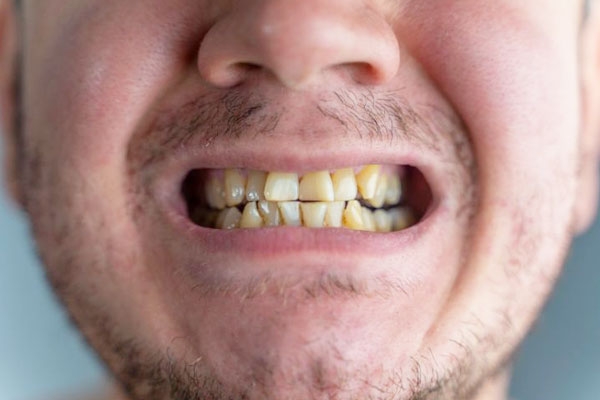
(Image source from: Canva.com)
Nicotine stains are often one of the most obvious signs of smoking. For many people, this stubborn yellow or brown discoloration seems to be a permanent fixture, a reminder of their smoking habits that can last long after the last cigarette. You may want to wipe it off immediately, but stains don't stick as easily (like memories of an ex). However, does this mean that the stain will not completely return to its original state? To treat nicotine stains, it is important to understand how nicotine stains form. Nicotine itself is colorless, but when it combines with oxygen, it turns yellow and leaves a stubborn residue on your teeth. Add to this tar from tobacco smoke and chewing tobacco residue, and the outer layer of your teeth, the enamel, becomes the main target for discoloration. Because tooth enamel is porous, it easily absorbs these pigments and stains become more difficult to remove over time. Even seemingly harmless methods like steaming can cause similar marks and make your smile look dull and older.
Nicotine reduces saliva production, which is important for neutralizing acids and flushing out food particles, leading to an increased risk of tooth decay and tooth decay. Tobacco use also contributes to the development of periodontitis because it restricts blood flow, making it harder for gums to heal and fight infections. Additionally, long-term tobacco use weakens tooth enamel, making teeth more susceptible to damage, sensitivity and tooth decay. These habits can lead to bad breath, gum recession, and in severe cases, oral cancer, highlighting the need to stop them to improve the overall health of your teeth and gums. Now, when you notice stains forming on your teeth, you may be in disbelief at first, but once they become clearly visible, alarm bells start ringing. How to Remove a Stain The first thing you'll probably want to do is search YouTube or Google for easy solutions. If all else fails, check out your local medical supply store for an easy solution. But does it really help?
Commercial bleaches can help fade nicotine stains to some extent, especially for light stains. However, it may not be as effective as professional teeth whitening treatments, especially for deep-seated stains. Whitening toothpastes, strips, and gels contain mild abrasives and low concentrations of bleaching agents such as hydrogen peroxide, which can fade superficial stains over time. Well, as previously mentioned, tooth enamel is porous. So if the stain penetrates too deeply, you won't get the desired result. In addition, long-term use can damage your teeth. Continued use of these products may result in gradual improvement, but over time they damage the tooth surface. For stubborn or large areas of discoloration, professional teeth whitening and teeth cleaning treatments are usually more effective. Additionally, overuse of over-the-counter products can cause tooth sensitivity and tooth enamel damage. Therefore, be careful when using it.
Teeth cleaning, including scaling and polishing, can remove surface discoloration caused by nicotine. For deeper stains, professional teeth whitening procedures are often used, in which the appropriate concentration of bleaching agent, such as hydrogen peroxide, is used to dissolve the stains embedded in the enamel and covering the gums. Advanced options such as laser whitening enhance the whitening process, providing faster and more impressive results. If tooth discoloration is severe or tooth enamel is damaged, cosmetic procedures such as veneers or aligners can restore the appearance of teeth by covering the discolored areas. A more common problem is tooth sensitivity, which occurs when whitening products temporarily expose the dentin layer beneath the enamel. Bleaching solution can cause gum irritation in some people when it comes into contact with soft tissue. Excessive use of whitening products, especially at-home kits, can lead to erosion of tooth enamel, further decay and further discoloration.
Quitting nicotine is the best way to prevent new stains and improve your overall oral health. For those who do not want to quit smoking, developing healthy oral hygiene habits can make a difference. Brush your teeth at least twice a day, floss daily, and use an antibacterial mouthwash to reduce the appearance of stains. Drinking water after consuming nicotine-containing products provides additional protection for your teeth while limiting staining from foods and beverages such as coffee and red wine.







